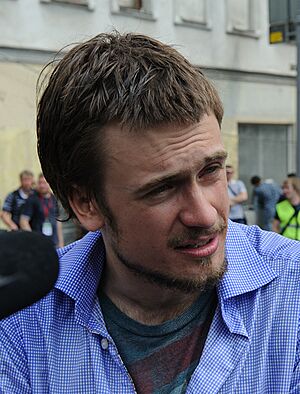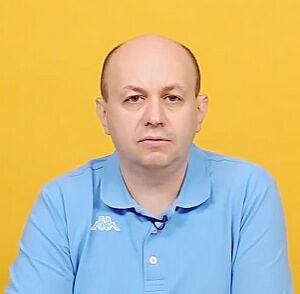Mediazona facts for kids
 |
|
|
Type of site
|
News website |
|---|---|
| Available in | Russian, English |
| Owner | Pyotr Verzilov |
| Created by | Nadezhda Tolokonnikova, Maria Alyokhina |
| Editor | Sergey Smirnov (editor-in-chief) |
| Commercial | Yes |
| Registration | None |
| Launched | September 4, 2014 |
| Current status | Active |
|
Content license
|
Proprietary |
Mediazona is an independent news website from Russia. It reports in both Russian and English. The site was started by Maria Alyokhina and Nadezhda Tolokonnikova, who are also known for starting the protest group ... Riot. Mediazona focuses on news about Russia's courts, police, and prison system.
The website works with a group called Zona Prava ("Zone of Justice"). This group helps protect the rights of people in prison. The goal of Mediazona is to share stories and information that might not be found in other news sources.
Contents
The Story Behind Mediazona
The idea for Mediazona came from the personal experiences of its founders. They wanted to shine a light on parts of the justice system they felt were unfair.
Why Was It Created?
Maria Alyokhina and Nadezhda Tolokonnikova started Mediazona in 2014. This was after they were released from prison. They were arrested in 2012 after their group, ... Riot, performed a protest song in a famous cathedral in Moscow.
During their time in prison, the founders said they saw many problems and that people were treated very poorly. They wanted to make sure these kinds of stories were told.
They also started Mediazona because many other independent news websites in Russia were changing. The government was gaining more control over the media. This meant there were fewer places where people could read news that questioned the government's actions.
When they launched the site, Tolokonnikova said:
Because of the heavy censorship by authorities there is no space for anything in the media that criticizes Putin's policies and tracks human rights abuses by Russian courts and law enforcement. Courts, prisons, arrests, convictions... our new media outlet will try to cover it all.
Alyokhina also added:
There is a great need for transparency and media coverage of things that are happening [in courtrooms], so we hope that Mediazona will help close that gap.
Mediazona Today
Mediazona has become an important source of independent news from Russia. However, it has faced many challenges over the years.
Reporting on Difficult Stories
Mediazona often reports on tough subjects. For example, it has worked with big international newspapers like The Guardian and Vice to share stories from Russia with the world.
Journalists working for Mediazona have sometimes faced dangerous situations. In March 2016, a Mediazona journalist named Yegor Skovoroda was with a group of reporters and activists. They were traveling near the region of Chechnya when their group was stopped and their vehicle was set on fire. This shows the risks journalists can face when trying to report on sensitive topics.
Facing Government Pressure
On January 30, 2021, the editor-in-chief of Mediazona, Sergey Smirnov, was detained by police.
Later that year, on September 29, 2021, the Russian government added Mediazona to a list of "foreign agents". This label makes it much harder for news organizations to operate in Russia.
On March 6, 2022, Russia's media regulator, Roskomnadzor, blocked Mediazona's website inside Russia. This was because of its reporting on the 2022 Russian invasion of Ukraine. The government demanded the site shut down.
Mediazona refused to close. The editors released a statement promising to keep working. They wrote:
We were prepared for this... We understand all our risks, but we continue to work — this is our duty to our readers and to ourselves.
They also gave Russian readers advice on how to get around the government's censorship.
Financial Troubles
In early 2025, Mediazona faced serious money problems. This happened after the U.S. government froze foreign aid, which had helped fund the site. By March 2025, the website announced it was "running out of money."
To keep the site going, its top editors began working without pay. They asked their readers for help, saying they needed 5,000 people to sign up for monthly donations to stay open.
Awards
- Free Media Awards 2020.




